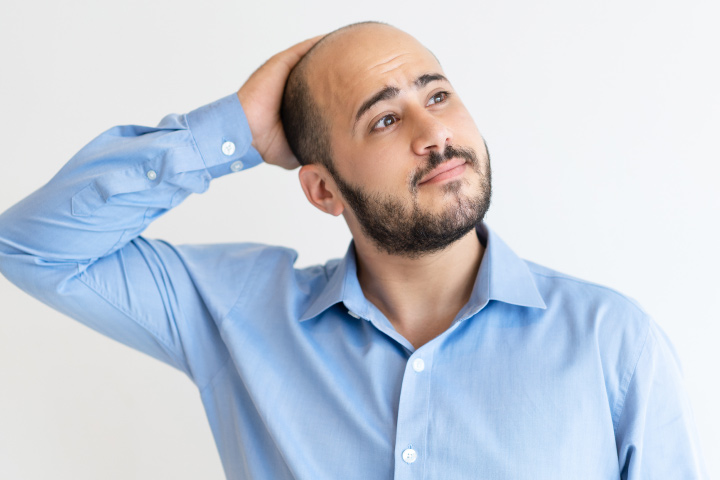Hair fall

Are you tired of seeing your hair fall at every step?
The majority of healthy individuals shed up to 100 hair strands each day. New strands develop to replace the ones you lose as part of the cycle of hair growth.
Hair loss is a condition where you start to lose more hair and have little to no hair growth. There are various types of hair loss, and it can affect both children and adults of any gender. You could lose hair only on your head or hair all over your body.
There may be different types of hair fall at different stages of life but still, you can get back your self-confidence and healthy hair by taking treatments from our specialist.


Is Hair loss common?
Losing hair is natural. Between 50 and 100 hairs can fall out per day, frequently undetected. Even though hair loss is typically nothing to be concerned about, it can occasionally be a symptom of a medical condition. Male and female pattern baldness are two examples of hair loss that is permanent.
Anyone can experience hair loss, regardless of age, sex, or ethnicity. Although male pattern baldness is a problem, which is why we all tend to identify hair loss with men, it can affect women of all ethnic origins. While non-genetic causes of hair loss (including traction alopecia, stress, and hormones) can affect anyone at any time, they are more likely to manifest as people age.
Why does hairfall occur?
The causes of hair loss might vary widely. The most typical ones are:
- Hereditary hair loss is caused by inherited (from your parents) genes.
- Infection from fungi on the scalp.
- Tight ponytails, hair extensions, or other hairstyles that tug the hair tightly.
- Processed hair products that could harm your hair (such as bleach and perms).
- Alterations in hormones caused by pregnancy, delivery, or menopause.
- Medical care (including chemotherapy and certain drugs).
- Nutritional inadequacies, especially insufficient protein or iron intake.
- Occurrences that cause stress (such as getting surgery or losing a loved one).
- Thyroid condition.
But there is nothing to be afraid of, it can be treated and transplanted back with the help of a dermatologist/trichologist (expert in human hair).
What may be the treatments for hair-loss?
If medication, hormonal changes, thyroid disease, or diet are to blame for your hair loss, the doctor will deal with the underlying problem. In many cases, addressing the root cause of the issue is all that is required to stop hair loss.
The majority of hair loss therapies are intended to cure androgenic alopecia, also known as alopecia which refers to male- and female-pattern hair loss. These remedies consist of:
- Medication: The initial line of treatment for thinning hair is typically topical, over-the-counter drugs applied to the scalp (such as minoxidil or Rogaine). Finasteride, also known as Propecia, is an oral drug available only by prescription for males who have male-pattern baldness.
- Hair transplant: Your doctor carefully pulls strands of hair from a part of your head where the hair is thickest during a hair transplant. The service provider then implants those strands into the areas of your scalp with the thinning hair.
- Platelet-rich plasma (PRP): Your healthcare professional isolates the plasma from your blood after drawing it. This platelet-rich plasma is then injected into your scalp. PRP therapy can halt hair loss and promote hair regrowth.
How can hair-loss be diagnosed?
Sometimes the reason for hair loss is evident, such as when you’re losing hair while receiving chemotherapy. Other times, your doctor will need to conduct some investigation to determine the reason behind your hair loss.
Depending on the situation, the specialist might:
- Inquire about your family history, especially the ages at which any ancestors first noticed hair loss.
- Examine your medical background.
- Obtain blood tests to check your iron and thyroid function.
- Check your scalp for indications of an infection.
- Test for skin conditions by taking a scalp biopsy.
Don’t suffer in silence if hair loss is a problem for you. Contact an expert medical professional who can identify the root of your hair loss and offer a customized course of treatment. You can address queries about hair loss that are specific to your need.
What can be the preventions for hair fall?
Although sometimes you can’t stop all types of hair loss, you may take measures to maintain the health of your hair and reduce loss. In order to lessen hair loss:
Can home remedies be affective?
Numerous “remedies” can be found online, such as hair masks or essential oils, that promise to stop hair loss. The truth is that these treatments will not stop genetic hair loss. They can, at best, lessen hair loss brought on by other reasons. They are typically thought of as time wasters. However, from the comfort of your own home, employing high-quality hair products, and laser combs, and avoiding heat treatment can help prevent hair loss.
“Make an investment in your hair, the crown you’ll forever wear.”

